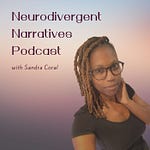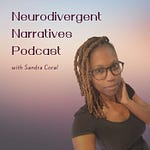
Photo by JD Mason on Unsplash
I think I’ve always been aware that I wasn’t really considered ‘good enough’ in this society, even while growing up as a transracial adoptee, away from other Black people to tell me that. But I spent my whole life trying to prove I was anyway. I chased the dream that if I could just be the best at what I do, surely I would show how good I was and thus be treated with every respect because of all I knew.
Only, it rarely works like that if you're Black. By default, we walk into most schools and are already considered the least intelligent ones there. Coupled with any ADHD presentations that are taken as further evidence of this fact, it makes it that much harder to convince (white) people that you could be very good at what you do. It’s pretty much decided for you that reaching your ‘potential’ will be a non-event, so it’s up to you to prove to everyone that they’re wrong.
White suprematist culture society overvalues the English language and the written word. It’s been the gatekeeper that’s kept my Black brothers from ever believing they couldn’t be anything remotely successful in life. It’s what’s kept me from achieving my childhood dream of becoming a clinical psychologist too, because I just couldn’t get my grades high enough with the ways my knowledge was assessed. But my brothers never fit the school system. No one really cared what they were good at because the only choices they had were to suffer the system or not. If they couldn’t conform, the problem was them and they’d be disposed of. Neither one of them finished high school in a traditional way.
I learned quick that doing well in school was what I had to do in order to be acceptable. If I could manage to get some sort of qualifications and find some sort of success with academics, then I maybe would be worth something more. Then I would have proved it, because I finally had that paper in my hand.
But with every paper that you get, it never feels like enough. There is always someone else that has a better one, from a better place or completed the right way.
Worthiness is never felt when it’s looked at from the lens of trying to reach ‘your potential.’
In school I was quite good at the language part, (especially when you ignored the fact that my exam grades could drop my final grades by about 15%, which everyone did), but maths was always difficult and I never did nearly as well. That closed a lot of doors for me in furthering my education, but I got my masters in the end. Oddly enough, that’s never felt good enough either. When it comes to achieving my potential, then it will never be good enough, because I know that regardless of my qualifications, being Black devalues them.
So in turn, I’ve learned to devalue myself.
I have a list of all the ways I’m not good enough that my ADHD brain loves to remind me of. What I couldn’t do at school, and the qualifications I’ll never have comes up often. There’s not a lot of joy around receiving my MA either, regardless of how much I worked to get it, that I’m the only one in my family who will ever receive one, or the fortune I have in even having one in the first place!
I know a lot of people say that a late ADHD diagnosis feels terrible because of what could have been. Sometimes I think of that too. But I also saw what happened to my Black brothers even though they were both diagnosed as kids. That fact didn’t save them, and it reminds me that the same thing probably would have happened to me too. Being diagnosed at a younger age doesn’t guarantee access to support, consideration for your abilities, or escape from the overlapping oppressions that decide your potential (and thus attempt to determine your worthiness) the moment you walk through the school doors. Being diagnosed younger is much better, I completely agree, but for so many students, it still won’t matter.
My potential was funnelled to this point by a culture that values only a certain way of communicating knowledge, particularly when that person is white. My strengths or who I was, were never considered in the potential that was set for me. Neither was what I needed to best show my knowledge or how I learned either. I don’t think that I was ever seen for who I really was or what mattered to me in the first place. I’m also pretty sure I was thought of as someone that would do a lot worse in life, so there wasn’t much of a point in supporting her efforts.
Only, I didn’t do as badly as they all thought. But I know I could have done a lot better. Especially if they were willing to see me as I was and all I could be, instead of what little they thought I should be.
Now it’s time to set my potential myself, because I see a whole lot of possibilities in me that no one took the time to see.










Share this post